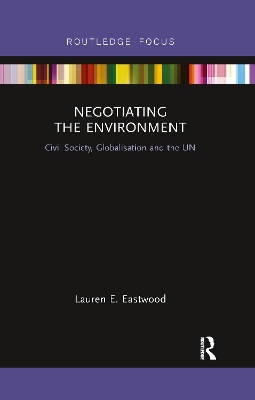
Negotiating the Environment
Civil Society, Globalisation and the UN
Seiten
2020
Routledge (Verlag)
978-0-367-60660-2 (ISBN)
Routledge (Verlag)
978-0-367-60660-2 (ISBN)
This book elucidates the complexity of how participants engage in these negotiations through the various processes that take place under the auspices of the UN – primarily those related to climate, biodiversity and forest agreements.
Civil society participants have voiced concerns that the environmental problems that were the subject of multilateral environmental agreements negotiated during the 1992 Rio processes are not serving to ameliorate global environmental problems. These concerns raise significant questions regarding the utility of negotiating agreements through the UN. This book elucidates the complexity of how participants engage in these negotiations through the various processes that take place under the auspices of the UN—primarily those related to climate and biological diversity.
By taking an ethnographic approach and providing concrete examples of how it is that civil society participants engage in making policy, this book develops a robust sense of the implications of the current terrain of policy-making—both for the environment, and for the continued participation of non-state actors in multilateral environmental governance. Using data gathered at actual negotiations, the book develops concepts such as participation and governance beyond theory. The research uses participant observation ethnographic methods to tie the theoretical frameworks to people’s actual activities as policy is generated and contested.
Whereas topics associated with global environmental governance are traditionally addressed in fields such as international relations and political science, this book contributes to developing a richer understanding of the theories using a sociological framework, tying individual activities into larger social relations and shedding light on critical questions associated with transnational civil society and global politics.
Civil society participants have voiced concerns that the environmental problems that were the subject of multilateral environmental agreements negotiated during the 1992 Rio processes are not serving to ameliorate global environmental problems. These concerns raise significant questions regarding the utility of negotiating agreements through the UN. This book elucidates the complexity of how participants engage in these negotiations through the various processes that take place under the auspices of the UN—primarily those related to climate and biological diversity.
By taking an ethnographic approach and providing concrete examples of how it is that civil society participants engage in making policy, this book develops a robust sense of the implications of the current terrain of policy-making—both for the environment, and for the continued participation of non-state actors in multilateral environmental governance. Using data gathered at actual negotiations, the book develops concepts such as participation and governance beyond theory. The research uses participant observation ethnographic methods to tie the theoretical frameworks to people’s actual activities as policy is generated and contested.
Whereas topics associated with global environmental governance are traditionally addressed in fields such as international relations and political science, this book contributes to developing a richer understanding of the theories using a sociological framework, tying individual activities into larger social relations and shedding light on critical questions associated with transnational civil society and global politics.
Lauren E. Eastwood is Associate Professor in the Department of Sociology at the State University of New York at Plattsburgh, USA.
List of Figures
Acknowledgements
List of Acronyms
Chapter 1: The Politics of Nature and the Nature of Politics
Chapter 2: Setting the Scene: The UN as an Ethnographic Research Site
Chapter 3: The Contested Terrain of Action: Civil Society in UN Climate Negotiations
Chapter 4: Civil Society Engagement in Regulating Biotechnology under the UN
Chapter 5: The Elephant in the Room: The Treadmill of Production as the Root Cause of Environmental Harm
Index
| Erscheinungsdatum | 01.07.2020 |
|---|---|
| Reihe/Serie | Routledge Focus on Environment and Sustainability |
| Verlagsort | London |
| Sprache | englisch |
| Maße | 138 x 216 mm |
| Gewicht | 453 g |
| Themenwelt | Naturwissenschaften ► Biologie ► Ökologie / Naturschutz |
| Sozialwissenschaften ► Politik / Verwaltung ► Europäische / Internationale Politik | |
| Technik ► Umwelttechnik / Biotechnologie | |
| ISBN-10 | 0-367-60660-7 / 0367606607 |
| ISBN-13 | 978-0-367-60660-2 / 9780367606602 |
| Zustand | Neuware |
| Haben Sie eine Frage zum Produkt? |
Mehr entdecken
aus dem Bereich
aus dem Bereich
Lehrbuch zu Grundlagen, Technologie und Praxis
Buch | Hardcover (2022)
Hanser (Verlag)
34,99 €


